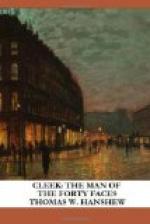“It would at least be more courteous, Mr. Narkom,” Miss Morrison interposed. “So great a man doing so great a favour—Oh, yes, I really think that Mr. Van Nant should.”
“Oh, well, let him then, by all means,” said Narkom. “Go, if you choose, Mr. Van Nant. I’d let you have my motor, only I must get over to the station and ’phone up headquarters on another affair in five minutes.”
“It doesn’t matter, thank you all the same. I can get a taxi at the top of the road,” said Van Nant; and then, making his excuses to Miss Morrison and her father, he took up his hat and left the house. As a matter of fact, it was only courtesy that made him say that about the taxi, for there is rarely one to be found waiting about in the neighbourhood of Wandsworth Common after half-past nine o’clock at night, and nobody could have been more surprised than he when he actually did come across one, loitering about aimlessly and quite empty, before he had gone two dozen yards.
He engaged it on the spot, jumped into it, gave the chauffeur his directions, and a minute later was whizzing away to the isolated house. It was eight minutes past ten when he reached it, standing as black and lightless as when he left it four hours ago, and, after paying off the chauffeur and dismissing the vehicle, he fumbled nervously for his latchkey, found it, unlocked the door, and went hurriedly in.
“Have you come yet, Mr. Cleek?” he called out, as he shut the door and stood in the pitch-black hall. “Mr. Cleek! Mr. Cleek, are you here? It is I—Maurice Van Nant. Mr. Narkom has sent me on ahead.”
Not a sound answered him, not even an echo. He sucked in his breath with a sort of wheezing sound, then groped round the hall table till he found his bedroom candle, and, striking a match, lit it. The staircase leading to the upper floors gaped at him out of the partial gloom, and he fairly sprang at it—indeed, was halfway up it when some other idea possessed him, brought him to a sudden standstill, and, facing round abruptly, he went back to the lower hall again, glimmering along it like a shadow, with the inadequate light held above him, and moving fleetly to the studio in the rear.
The door stood partly open, just as he had left it. He pushed it inward and stepped over the threshold.
“Mr. Cleek!” he called again. “Mr. Cleek! Are you here?”
And again the silence alone answered him. The studio was as he had seen it last, save for those fantastic shadows which the candle’s wavering flame wreathed in the dim corners and along the pictured walls. There, on its half-draped pedestal, the Roman senator stood—dead white against the purple background—and there, close to the foot of it, the great bulk of the disproportionate nymph still sprawled, finished and whitewashed now, and looking even more of a monstrosity than ever in that waving light.




